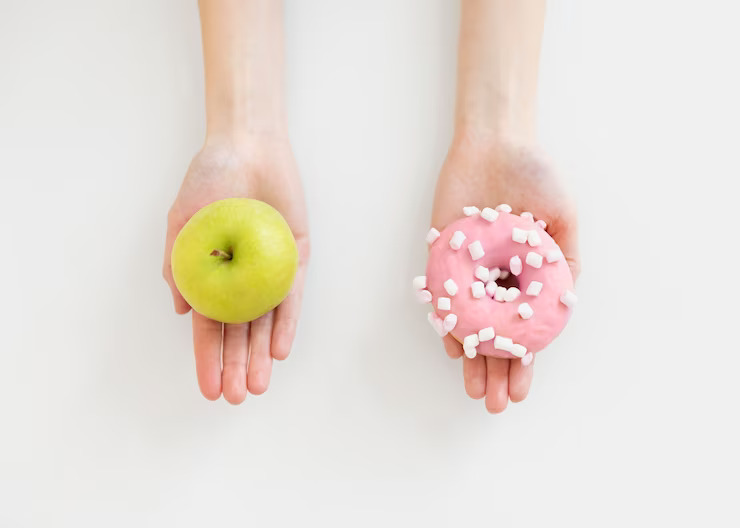Are you also a person who wakes up and immediately checks whether your belly is looking flat in the mirror and becomes happy? But as soon as the day ends, your stomach is so swollen and you wonder why.
Have you ever enjoyed a particularly delicious meal and instantly feel like your jeans are getting tighter or uncomfortable in your stomach like a bubble puff?
These are a few signs of bloating which people experience occasionally and some even face bloating issues throughout the day.
Bloating is not because of fat cells but is caused due to gas accumulation or water retention. It is a very common issue faced by almost everyone. The entire day goes fine, but then as soon as you have a meal, bloating problems arise.
Instead of taking medicines immediately, I always emphasize on finding the root cause of a problem. This will not only help you find an instant solution, but will benefit your body with long-term benefits instead of short-term gains says, Lavleen Kaur, a renowned dietitian in Chandigarh.

Here are a few common causes of bloating and easy home remedies:
1. Avoid sitting for prolonged hours
If you think that exercising once during the day or doing early morning yoga is sufficient, then you might be wrong. I agree that exercise and yoga is good for your body, but at the same time if you spend 2-3 hours continuously in front of your laptop then it will only prove to be detrimental to your body. Irrespective of how healthy you eat, if you don’t take frequent breaks while working on your laptop, bloating issues will arise.
Remedy: The longer you sit in one place, the more bloating you’re going to face.
While you’re working, it may be easy to lose track of time, but you need to take frequent breaks consciously. I would advise you to move every 30-40 minutes from your chair and probably take a two-minute water break.
Also, don’t sit down immediately after having a meal, you need to move-take a walk or at least sit in vajrasana (also known as thunderbolt or diamond pose). This will allow the circulation of blood to function properly and reduce gas accumulation at one place.

2. Menstrual bloating
Bloating can be an early symptom of the menstrual cycle in most women. You may experience an uncomfortable feeling of swelling in your stomach or might feel as though you have gained weight. This usually happens 4-5 days before your menses begin and then gradually fades away after your menstrual cycle. As research shows, it happens because the estrogen level is decreasing while progesterone (menstrual hormone) is increasing.
Remedy: Even though it might be difficult to completely avoid period bloating because its a natural process but you can always take a few measures to reduce the uncomfortable feeling of bloating.
You can have soothing drinks such as chamomile tea, cardamom (elaichi) or you could also soak a few black raisins overnight and eat them as soon as you wake up. This will not only reduce bloating during your menstrual days, but also help ease hormonal imbalances.
Another useful home remedy could be simply doing some belly exercises before your menses begin. Don’t get scared, I am not talking about doing crunches or heavy weight exercise, but some simple core strengthening exercises. For eg, Place your finger on your naval, now move four fingers upwards towards your chest and start moving your fingers in slow circular motion. Repeat the same circular motion with one finger above the naval and then with four fingers below your naval point.

3. Manage High Anxiety and Stress Level
It’s no doubt that anxiety and stress can trigger common digestive problems like bloating. Have you ever noticed your stomach feel uneasy during a stressful situation? This happens because the cortisol hormone in our body is increasing and simultaneously our mind follows a “fight or flight” feeling which affects our gut health, leading our stomach to bloat.
Remedy: The best remedy would be to allow your mind to relax. Try meditating or doing simple breathing exercises when faced with a stressful situation. Trust yourself and try to maintain calmness in your body and mind.
4. Carefully observe your food intake
One of the most common reasons for bloating is the intake of certain food. Many people claim that eating legumes (i.e. lentils, rajma, soybeans, peas, peanuts) or cruciferous vegetables like cauliflower, cabbage and broccoli cause bloating. You do not need to completely avoid eating them because such digestive problems may vary from person to person.
Remedy: Change the cooking method of such gas producing food items. For instance, always soak legumes overnight with a pinch of salt or hing. This will reduce the existing gas and acids and prevent bloating issues. Even while cooking the legumes, you could add some hing into it through tadka as advised by every Indian mother.
For cruciferous vegetables, you can either steam them or sauté the vegetables instead of consuming them raw.There are several steps you can take to avoid bloating after a meal and promote better digestion. These helpful tips will guide you on how to make the most of your lunch break while avoiding post-meal bloating.

5. Avoid high sodium content
Have you ever noticed that whenever you eat outside food, you always feel bloated? This happens because of highly refined salt that is found in food. You may be aware of how consuming too much salt can cause detrimental damages to your body, including bloating in the short run.
Salt causes water retention. This means that the high intake of salt will absorb the excess water in your body and make you feel swollen or bloated.
Remedy: I am not telling you to avoid outside food. You should still take a small elachi with you, which you could have after an outdoor dinner. Also restaurants know that their food is rich in salt, which is why they always offer fennel seeds (saunf) before you leave to ease your digestion. When at home, you could always have a tablespoon of ghee jaggery to reduce the bloating.
Also remember: Always consume in moderation. Whether it is outside food or homemade, overeating will always cause bloating issues. Therefore, watch your food intake and the amount of salt that goes into your cooking. Research states that our body should only consume 5g of salt in a day. So you could place a container with 5g salt and check how much of it goes into daily cooking.
6. Restrict Junk food and sugary content
It is obvious that the more junk you eat, the more bloated you’ll feel. Junk food is filled with processed carbs, fat and sodium which is hard to digest.
By now you may be aware about the dangerous effects of high sugar content like diabetes, high blood pressure, fatty liver and even increased chances of heart disorders.
Remedy: My advice would be to completely avoid refined sugar and limit the amount of the junk food. Sometimes fruits like watermelon and even mango can cause bloating and fermentation issues because they also contain a form of sugary content. Therefore, never have fruit with a meal, either have it after meal (around 4-5pm) or early morning after waking up.
More importantly, We need to improve our gut health. One way to do this by including probiotics in your daily dietary routine to improve digestion and reduce the problems of bloating in the long run. Probiotic foods include yogurt, lassi or buttermilk.
7. Avoid Fizzy drink
Carbonated drinks have to be one of the main culprits of bloating especially if you drink it quickly. My advice would be to completely avoid carbonated drinks because they are not suited for our bodies. Carbonated drinks contain high amounts of carbon dioxide which traps gas in your body leading to bloating issues.
This happens because the fizzy drinks tend to spike insulin levels in our body causing pancreas to overwork in order to maintain a balance of the sugar rush.
Remedy: Avoid fizzy drinks at all costs, or at least do not consume them with food.
Here are other few home remedies to avoid bloating:

- Exercise and yoga: Diamond pose (vajrasna) is one of the best poses but there are many other yoga poses that can help with bloating issues. You could also try simple breathing exercises before every meal. This will reduce and maintain the gas accumulation in your stomach and allow free flow of oxygen in the body, preventing problems of bloating after meals.If you’re interested in learning more about yoga and exploring different poses and techniques specifically targeted at bloating relief, there are various online yoga sessions available that you can join. These sessions provide guidance and support in incorporating yoga into your daily routine, helping you find relief from bloating and promoting overall well-being.
- Consume magnesium and potassium rich food: High levels of sodium content (salt) with low intake of magnesium and potassium is not advisable as it will only create digestive problems. Magnesium and potassium rich food include nuts and seeds like sunflower,pumpkin, sesame or watermelon seeds. You can also have a banana as soon as you wake up in order to prevent bloating throughout the day.
- Maintain sufficient water intake: Lack of water intake can cause dehydration and create bloating problems. Therefore, make sure to have sufficient amounts of water throughout the day. You might wonder how much water is enough, whether it’s 6 or 10 or 12 glasses. But remember you are the best judge of your body. You should be able to judge the intake of your water by the color of your urine. If it is crystal white, your body is hydrated, but if it is yellow or brown, you need to drink more water.
- Include Vitamin B6 food in your diet: These foods include bananas, walnuts, peanuts, soya beans, and even poultry. Food rich in vitamin B6 reduces water retention and therefore prevents bloating problems.You should also consider drinking a mixture of jeera, ajwin and saunf water to minimize bloating instantly. Or you might want to try soaking watermelon seeds in some water and drink it the next morning.Another beneficial home cure is to soak ginger and one elaichi (cardamon) in some water overnight and drink it in the morning or you could boil it and have warm water immediately.
- Maintain a simple food log dairy: Noting down what food you consumed can help you track down food items that may close bloating. Because food intake varies from person to person, bloating can be caused due to different reasons. For a lactose intolerant person, consumption of dairy products could be harmful. That’s why maintaining a food log diary will help you track what food causes you to bloat, and it will also motivate you to eat healthier.
Some people even take food allergy tests, but there is no need to have a fear of food.
You can also take medicines to reduce bloating problems but that only leads to short term gains.
Instead, like I always say – aim to create dietary and lifestyle modifications for a better and healthier life.
Have a healthy journey!

